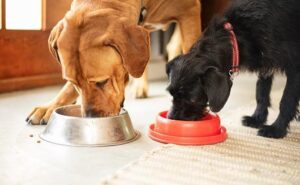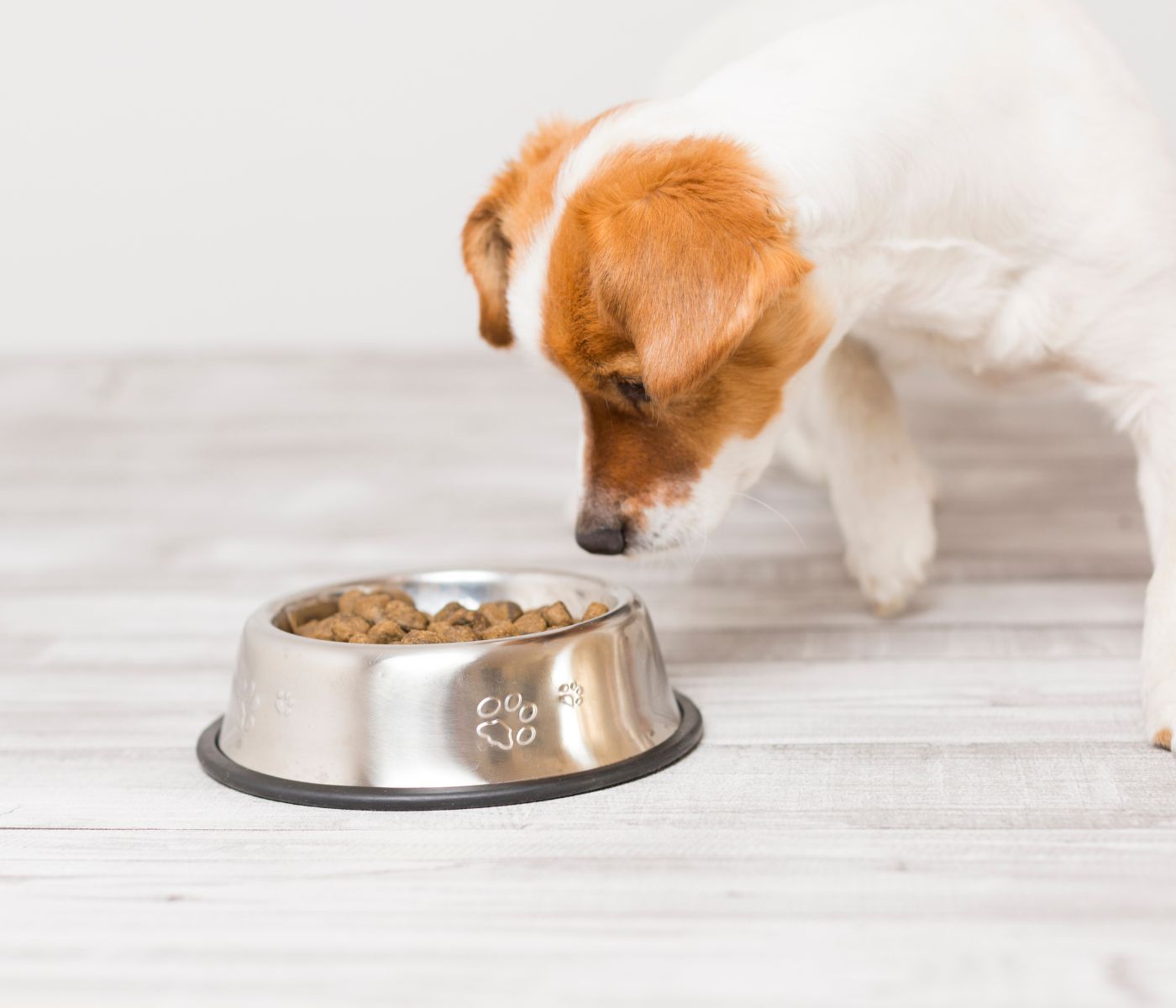If you have a small dog, you may be wondering if it’s okay to feed them large-breed food. After all, the food is designed for dogs that are twice their size, so how could it possibly be good for them?
As it turns out, there are some benefits to feeding large-breed food to small dogs. Large-breed food is more nutritionally dense, which means that your small dog will get more of the vitamins and minerals they need in each bite.
Additionally, large-breed food may help small dogs put on muscle and maintain a healthy weight.
Of course, there are also some drawbacks to consider. Large-breed food may be too caloric-dense for small dogs, which can lead to weight gain. Additionally, large-breed food may cause digestive issues in some small dogs.
And finally, large-breed food may not be appropriate for small dogs with certain health conditions.
So, what’s the verdict? Is it okay to feed your small dog large-breed food? Lets Find out!
Is it Okay to feed my small dog large-breed food?

Generally, it is okay to feed your small dog large-breed food. Smaller dogs tend to have higher metabolisms and burn through calories quickly, so they may benefit from the extra calories and nutrients found in large-breed foods.
Additionally, many small breeds are prone to weight gain, so the larger kibble size of most large-breed foods can help prevent overeating.
However, there are a few things to keep in mind when feeding your small dog large-breed food.
- First, not all large-breed foods are created equal. Some contain more calories and fat than others, so choosing a food specifically designed for small dogs is important.
- Second, you’ll need to adjust the amount of food you give your dog based on their weight and activity level.
- Finally, monitor your dog’s weight and body condition closely, as some small dogs may still gain too much weight on a large-breed diet.
The Pros of Feeding Large-Breed Food to Small Dogs

Large-Breed Food is More Nutritionally Dense
One of the biggest advantages of feeding large-breed food to small dogs is that it is more nutritionally dense. This means that it contains more vitamins, minerals, and other nutrients per serving than small-breed food.
This can be a big benefit for small dogs who may not be getting all the nutrients they need from their regular food.
Large-Breed Food May Help Small Dogs Put on Muscle
Another advantage of large-breed food is that it may help small dogs put on muscle mass. This is because the higher protein content in large-breed food can help build and maintain muscle tissue.
This can be a great benefit for small dogs who are looking to add some extra muscle mass.
Large-Breed Food May Help Small Dogs Maintain a Healthy Weight
Another advantage of large-breed food is that it may help small dogs maintain a healthy weight.
This is because the higher fat content in large-breed food can help keep dogs feeling full and satisfied after meals.
This can be a great benefit for small dogs who are trying to avoid becoming overweight or obese.
The Cons of Feeding Large-Breed Food to Small Dogs

Large-Breed Food May Be Too Caloric-Dense for Small Dogs
Large-breed foods are designed to meet the nutritional needs of dogs who weigh 50 pounds or more at maturity. This means that they are generally higher in calories than foods designed for small breeds.
For example, a cup of large-breed dry food may contain 400 calories, while a cup of small-breed dry food may contain only 300 calories.
This difference in calorie content can be significant for small dogs, who need far fewer calories than their larger counterparts.
If a small dog eats too much large-breed food, he may start to gain weight, which can lead to health problems like obesity and joint problems.
Large-Breed Food May Cause Digestive Issues in Small Dogs
The higher calorie density of large-breed food can also cause digestive issues in small dogs.
Because they are not used to digesting such a high level of calories, small dogs who eat large-breed food may experience stomach pain, diarrhea, and vomiting.
In some cases, these digestive issues can be severe enough to require veterinary attention.
Large-Breed Food May Not Be Appropriate for Small Dogs with certain Health Conditions

Some small breeds have special health needs that must be taken into consideration when choosing their diet.
For example, some small breeds are prone to developing liver disease if they eat too much protein (a common ingredient in large-breed food).
Other small breeds have sensitive stomachs and cannot tolerate the high fat content of many large-breed foods.
Before switching your small dog to a large-breed food diet, it is important to talk to your veterinarian about whether or not it is appropriate for your dog’s individual health needs.
How to choose the right large-breed food for your small dog?
When it comes to choosing the right large-breed food for your small dog, there are a few things you need to take into account.
- The first is the size of your dog. If your dog is on the smaller side, you’ll want to look for a portion of food specifically designed for small breeds. There are many of these foods on the market, so you should have no trouble finding one that’s right for your pup.
- The second thing you need to consider is your dog’s activity level. If your dog is relatively active, you’ll want to choose a food that’s higher in protein and fat. This will help them maintain their energy levels and keep their muscles healthy.
On the other hand, if your dog is more passive, you’ll want to choose a food that’s lower in calories and fat. This will help them avoid weight gain and associated health problems.
- Finally, it would help if you considered any special dietary needs or allergies your dog may have. For example, if your dog has allergies or sensitivities, you’ll want to choose a hypoallergenic food or one specifically designed for dogs with allergies.
There are also several grain-free and gluten-free options on the market if this is something you’re looking for.
Once you’ve taken all of these factors into consideration, you should be able to find the perfect large-breed food for your small dog!
Tips for feeding your small dog large-breed food:
If you’ve decided that large-breed food is the right choice for your small dog, there are a few things to keep in mind to ensure a healthy and successful transition.
- Choose a high-quality large-breed food: Like any other dog food, not all large-breed foods are created equal. Research to find a reputable brand that uses quality ingredients and provides the nutrients your small dog needs.
- Start slowly and increase gradually: When switching to any new type of food, it’s essential to do so gradually to avoid an upset stomach or other digestive issues.
- Start by mixing a small amount of the new food in with your dog’s current food, and slowly increase the proportion of new to old over a week or two.
- Monitor your dog’s weight and activity level: Pay close attention to how your dog looks and feels after switching to large-breed food. If you notice any changes in weight or energy level, consult with your veterinarian.
FAQs
Q: Is there a difference between small breed and large breed dog food?
A: Yes, there is a difference between small breed and large breed dog food. Small breed dog food is typically higher in calories and fat than large breed dog food. This is because small breeds tend to have higher metabolisms and need more energy.
Large breed dog food is typically lower in calories and fat, because large breeds tend to have slower metabolisms and don’t need as much energy.
Q: Can I give my medium sized dog large breed food?
A: The size of the food pellets is not as important as the ingredients list when choosing a food for your dog. You want to look for a food that is designed for your dog’s life stage. For example, a large breed puppy food will have different ingredients than a large breed adult food.
The adult food will have higher levels of certain minerals to help support joint health, while the puppy food will have higher levels of calories and protein to support growth.
Q: How do I know if my puppy needs large breed food?
A: Generally, large breed foods are formulated for dogs over 50 pounds.
If your puppy is growing quickly and seems to be eating a lot, large breed food may be a good option.
Large breed food is typically higher in calories and protein to help support a growing pup. However, it’s best to consult with your veterinarian to determine if large breed food is right for your puppy.
Q: Is Blue Buffalo good for small dogs?
A: Yes, Blue Buffalo is a great choice for small dogs. The company makes a variety of food formulas specifically tailored for small breeds, so you can find one that meets your dog’s individual needs.
Blue Buffalo food is also made with high-quality ingredients and does not contain any fillers or artificial preservatives.
Q: When should you transition from puppy food to dog food?
A: You should transition from puppy food to dog food at around one year of age. At this point, your puppy’s digestive system will be better able to handle the more adult-oriented food.
You may want to consult with your veterinarian to determine the best food for your dog’s individual needs.
